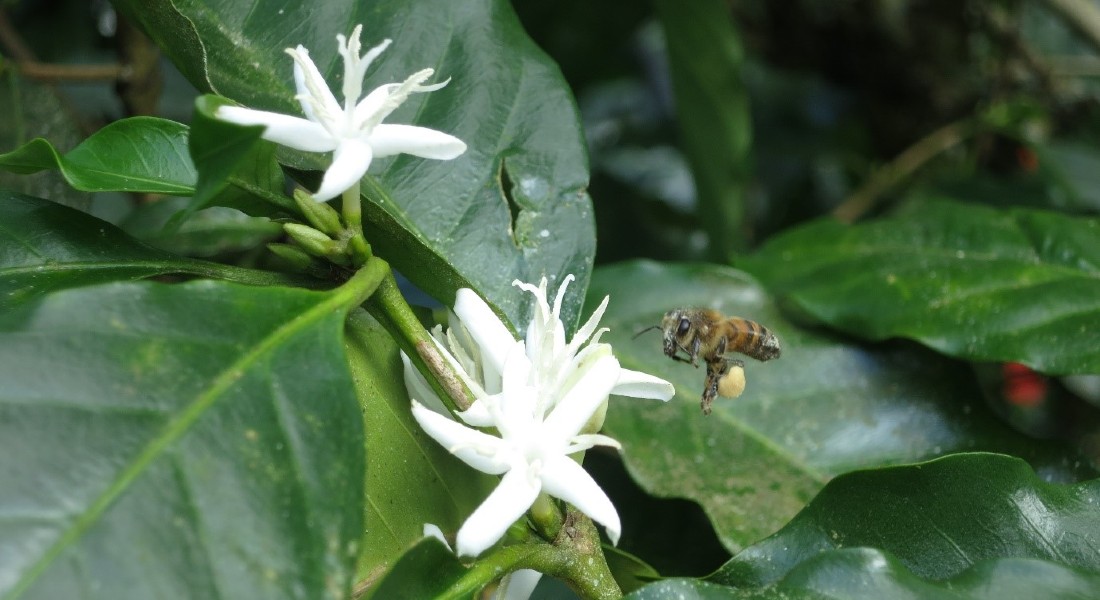Coffee fruit set benefits from pollinators and forest habitats
Bees and other animal pollinators play an important role in food production systems, but they are globally threatened by anthropogenic land use changes. A new meta-study led by researchers from Center for Macroecology, Evolution and Climate confirms their significant contribution to Coffea arabica production worldwide and indicates that forest habitats surrounding coffee farms may further strengthen their impact.

Millions of years ago, two taxonomic groups co-evolved in a famous interaction: bees and flowering plants (angiosperms). Bees depend on pollen and nectar from flowering plants for their nutrition. In return, many angiosperms can only reproduce due to animals transporting their pollen from the male to female flowers. This interaction makes bees and other pollinators like flies, moths, bats, and birds very important actors for wild plants and crops worldwide. Nearly 90% of all flowering plants are to some extent animal pollinated, and about 85% of the world-leading commodity crops, such as fruits, nuts, and vegetables, benefit to some extent from this pollination.
However, in the ongoing biodiversity crisis, many pollinators and their ecosystem functions are increasingly threatened. Global land use change and habitat fragmentation occur at accelerating rates and challenge efforts to protect biodiversity.
To understand the consequences of pollinator losses in food production systems, a team of researchers led by the Center for Macroecology, Evolution and Climate (CMEC) at GLOBE Institute and the Department of Food and Resource Economics (IFRO), conducted a global review on the role of bees and other pollinators in the production of an important trade crop – Arabica coffee. The CMEC center was represented by former PhD-student Céline Moreaux, postdoc Jesper Sonne, Professor Carsten Rahbek and Associate Professor Bo Dalsgaard from GLOBE as well as Professor Niels Strange from IFRO.
The study used data from existing coffee pollination studies across the globe to assess in a large meta-analysis how much animal pollination affects fruit set. What is more, the authors applied remote data analyses methods to evaluate satellite images of the forest, which are important nesting grounds for many bee species. These methods enabled them to understand how the amount of forest cover, distance to nearby forest and canopy density can impact coffee fruit set.
Coffee fruit set is higher when pollinators are present
The study, which was published in Agriculture, Ecosystems and Environments, confirms the importance of animal pollinators to global coffee production. “We find that about 18% more flowers of Coffea arabica turn into fruits when bees and other pollinators are present compared to when they are absent”, says lead author Céline Moreaux, former PhD student at CMEC and IFRO at the University of Copenhagen. “This is an important finding because it shows us that these animals make a significant contribution to global coffee production and that it can be very valuable to protect biodiversity in agricultural landscapes.”
Regarding the effect of forests on coffee pollination, the study finds that results differ depending on the density of forest habitat surrounding coffee farms. “In the data set, we observe that forests may positively affect animal pollination, when they are dense and have low disturbance levels. This is possibly because they provide high-quality habitats for bees”, elaborates Associate Professor Bo Dalsgaard, senior author of the study. “This suggests that the preservation of natural landscapes in and around agricultural production systems may be very important, not only to protect biodiversity but also to ensure the production of a crop that is so important in our daily lives.“
Read the full paper ‘The value of biotic pollination and dense forest for fruit set of Arabica coffee: A global assessment’ here.
Contact authors
